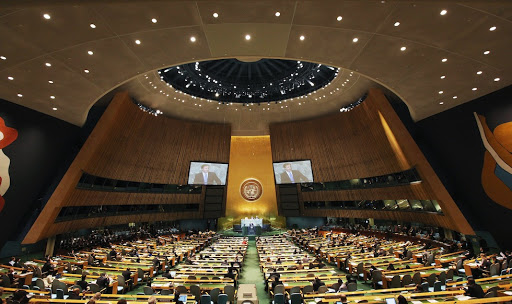Lenten Campaign 2025
This content is free of charge, as are all our articles.
Support us with a donation that is tax-deductible and enable us to continue to reach millions of readers.
The folks at Crux spoke to a few Catholics who watched the speech:
Republican Congressman Sean Duffy told Crux that he was proud of the president’s bold words on Tuesday. “As a Catholic and father of eight, I am proud that President Donald Trump stood up for the dignity of human life all over the world, and that he called on all nations of the world to allow their people to ‘flourish in the fullness of the life intended by God,’” he said. “I am encouraged that he was crystal clear about standing up to the threat of both radical Islamic terrorism and rogue regimes who plot against our freedoms,” he added. In addressing the global refugee crisis, the president said that the United States was a compassionate country and would continue to support efforts to resettle refugees, but would focus on doing so closer to their home countries. “For the cost of resettling one refugee in the United States, we can assist more than 10 in their home region,” said Trump. William Canny, executive director of Migration and Refugee Services at the U.S. Conference of Catholic Bishops, believes the president’s remarks fail to account for the refugees that are unable to be settled close to their countries of origin. “I share the President’s desire to help people stay where they are and in nearby surrounding countries,” said Canny, “but the United Nations has made specific, consolidated appeals to provide for basic needs, such as food, shelter, and schooling, and only 60 percent of the outlined needs of refugees were met last year and only 38 percent of those needs have been met so far this year.” …In an interview with Crux, Claes Ryn, executive director of the Center for the Study of Statesmanship at the Catholic University of America, said Trump’s speech would be remembered for its confrontational style, particularly against North Korea, and his emphasis on the importance of national sovereignty. Ryn said he believes that on one hand the President is fairly well aligned with Catholic social thought when it comes to emphasizing sovereignty – but he believes the President’s approach to North Korea fails to match Catholic teaching.
Read onto learn why.
Meantime, I haven’t seen any Catholic response to this part of the speech:
The United States has great strength and patience, but if it is forced to defend itself or its allies, we will have no choice but to totally destroy North Korea.
Shortly before the Iraq war, Cardinal Joseph Ratzinger declared:
The “concept of a ‘preventive war’ does not appear in the Catechism of the Catholic Church,” Cardinal Ratzinger noted. “One cannot simply say that the catechism does not legitimize the war,” he continued. “But it is true that the catechism has developed a doctrine that, on one hand, does not exclude the fact that there are values and peoples that must be defended in some circumstances; on the other hand, it offers a very precise doctrine on the limits of these possibilities.”
However, there is this passage in the catechism:
2309 The strict conditions for legitimate defense by military force require rigorous consideration. The gravity of such a decision makes it subject to rigorous conditions of moral legitimacy. At one and the same time: – the damage inflicted by the aggressor on the nation or community of nations must be lasting, grave, and certain; – all other means of putting an end to it must have been shown to be impractical or ineffective; – there must be serious prospects of success; – the use of arms must not produce evils and disorders graver than the evil to be eliminated. The power of modem means of destruction weighs very heavily in evaluating this condition. These are the traditional elements enumerated in what is called the “just war” doctrine.
The evaluation of these conditions for moral legitimacy belongs to the prudential judgment of those who have responsibility for the common good.
It goes on to note: “The fifth commandment forbids the intentional destruction of human life. Because of the evils and injustices that accompany all war, the Church insistently urges everyone to prayer and to action so that the divine Goodness may free us from the ancient bondage of war.”
Finally, of course, there is this, from Gaudium et Spes:
Any act of war aimed indiscriminately at the destruction of entire cities of extensive areas along with their population is a crime against God and man himself. It merits unequivocal and unhesitating condemnation. (80)

